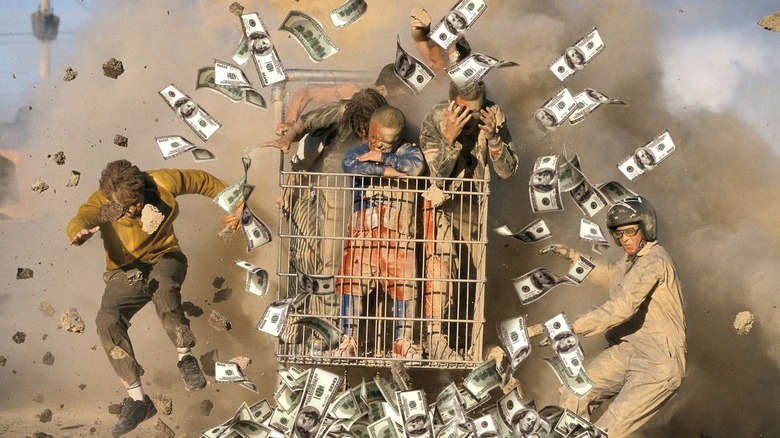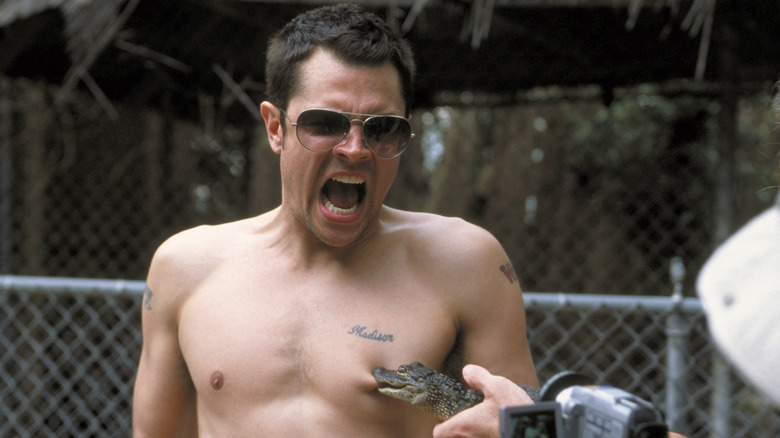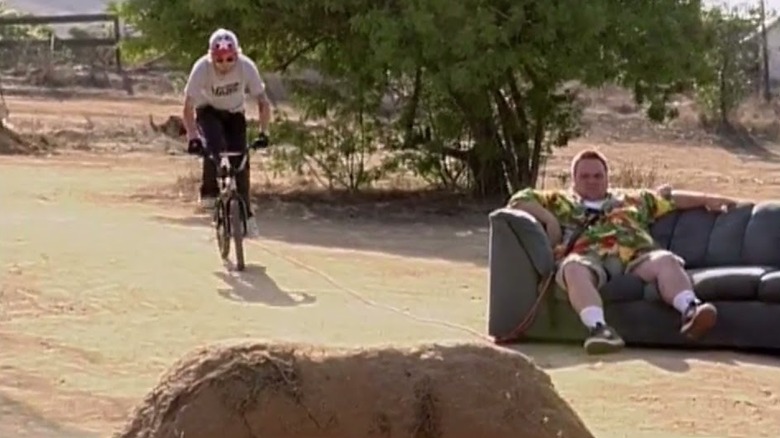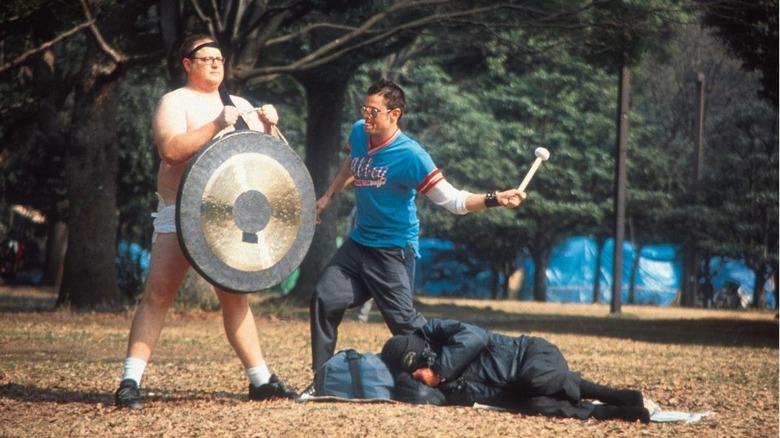Tales From The Box Office: How Jackass: The Movie Made A Big Leap To The Big Screen

(Welcome to Tales from the Box Office, our column that examines box office miracles, disasters, and everything in between, as well as what we can learn from them.)
In October of 2000, just at the turn of the millennium, MTV aired a cheap and risky TV show largely inspired by skateboarding videos of the late '90s and born out of Big Brother magazine called "Jackass." Centered around a group of unruly pranksters, amateur stuntmen, and skaters, the show provided gigantic ratings for the network and went on to become a controversial cultural phenomenon. Yet, because kids were inspired to try their own brand of jackassery and because the show had such a wide reach, things got complicated for the network and the show lasted just three seasons.
However, the phenomenon was far from over. MTV's parent company found a way to keep the "Jackass" crew together by giving them a budget and a larger platform: the big screen. Yes, in 2002 Johnny Knoxville and the gang, along with director Jeff Tremaine, took their show to movie theaters across the country with an R-rating and far fewer restrictions. The result, "Jackass: The Movie," spawned perhaps one of the most unlikely hit movie franchises in history.
Today, as "Jackass Forever" (the fourth main entry in the series) makes its way to theaters, we're going to look back at why "Jackass: The Movie" came to be, why it achieved such incredible success, and what lessons can be learned from that success. Let's dive in.
The Movie: Jackass: The Movie

"Jackass" stars Johnny Knoxville, Jeff Tremaine, Chris Pontius, Wee Man, and Steve-O all worked for a skateboarding magazine called Big Brother. The magazine was controversial and served as a major counterpoint to mainstream skateboarding magazines such as Thrasher that were being published at the time. Over the years, Big Brother released several videos that sold quite well and became cult hits -- though it was eventually determined that the wild stunts and wraparounds that were included in the videos are what drew a lot of attention. Skateboarding was secondary.
As such, Tremaine, Knoxville, and their pal director Spike Jonze -- then known for directing music videos for groups like the Beastie Boys, as well as his debut feature "Being John Malkovich" -- pitched "Jackass" using segments from the "Big Brother" videos. HBO passed, but MTV scooped it up right away. Unfortunately, during the second season, censorship became an issue and Knoxville ultimately quite because he didn't want to do a watered-down version of the thing that became so successful in the first place. In an oral history with The Hollywood Reporter, Tremaine explained how that paved the way for what would become "Jackass: The Movie."
"In the middle of us making this second season, the guy who ran MTV Films, David Gale, came over to me. He's like, 'You can make a movie out of this.' And I'm like, 'I don't even know how to make a TV show.' But when Knoxville quit, David popped up and said, 'Why don't you guys make a movie?' Spike had thought that could work. I didn't believe. It didn't seem like it was possible to turn this stupid little TV show into a movie, but we agreed we'd give it a try."
Initially, Knoxville expressed some hesitation but, ultimately, he came around to the idea when he realized it would provide more freedom and less restriction.
"I was against the movie because in my head I was like, 'What, are we going to act? Is this a scripted thing?' They're like, 'No. It's just like a naughtier version of what we do.' I'm like, 'That's a good idea.'"
And so, with the crew on board, a budget of $5 million, and a license to up the ante, the gang set to work, filming a bigger, badder, more entertaining version of "Jackass" for the moviegoing masses that would ultimately be unleashed on the world in October of 2002, just two years after the show had made its unexpected cultural impact on MTV.
The Financial Journey

With no real competition in its way, "Jackass: The Movie" arrived in theaters on October 25, 2022, and managed to take the top spot at the box office, with "The Ring" taking the number two spot in its second week. With $22.7 million in its opening frame, it blew the lid off of expectations and could have arguably been considered a success without adding another dime to its total, given the tiny production budget they were working with. But Paramount marketed the hell out of it, with the first poster boasting the tagline, "With stuff you'd never see on TV." People, as it turns out, really wanted to see that stuff.
All in all, "Jackass: The Movie" wrapped up its run with just shy of $80 million at the box office, which was a stellar result considering the $2 million budget. Yes, there was certainly a healthy marketing spend, but this was a home run in every way. That paved the way for "Jackass: Number Two" to follow in 2006. In the time between films, the "Jackass" crew became rockstars in pop culture and that only served to greatly benefit the sequel -- as did the heavily increased $11 million budget. The sequel did even better business, taking in $85 million.
The boys took a long break but did eventually return in 2010 to capitalize on the latest craze with "Jackass 3D." The pent-up demand served the film well and it opened to a tremendous $50 million, en route to a global total of $171 million. That would pave the way for Knoxville to return for the spin-off, "Bad Grandpa," which also earned a stupid good $160 million against a $15 million budget. These were dream returns for a studio, with each film needing a minimal investment to get huge profit margins. All told, the franchise has earned $497 million worldwide against combined budgets of $48 million. And let us not forget that the home video market was for more robust during this time, meaning Paramount was certainly raking in a whole lot more money from that side of the business as well. Not bad for some scrappy skater punks from the magazine world!
The Lessons Contained Within

Nothing is ever dead in Hollywood these days, so the return of the gang in "Jackass Forever" was probably inevitable. But one thing that can and should be taken away from the success this franchise has enjoyed for more than 20 years now is the fact that Paramount was smart enough to let this thing be what it needed to be. Don't water it down; do the exact opposite. Let it breathe and flourish into the best possible version of the thing that audiences latched onto in the first place. That feels crucial in the era we live in now.
Currently, many studios and streamers appear to be obsessed with casting the widest net possible to gobble up what (relatively) few box office dollars there are to be had, or to capture the attention of a potential subscriber. In many cases, that wide net can result in bland movies and TV shows that are overly concerned with playing it safe. "Jackass" was insanely risky and certainly didn't look like beginnings of a major money-making film franchise. Yet here we are, nearly two decades after the first movie hit theaters, ready to watch "Jackass Forever" dethrone "Spider-Man: No Way Home" atop the weekend box office. That wouldn't have happened if Paramount and MTV had played it safe.
Risk is often rewarded in this business. "Iron Man" was a gigantic risk in 2008, and yet it started the most successful franchise in cinema history. Jordan Peele's "Get Out," coming from a man known primarily for his work on a sketch comedy show, was also a risk, and it turned out to be one of the defining genre films of the last decade. It's not to say that there is no reward for playing it safe in Hollywood, but it seems the richest rewards often come from taking a gamble on something out of the box. It's also worth noting that Paramount has also done an excellent job of keeping the "Jackass" budgets under control, which has allowed the movies to not be burdened by unrealistic expectations.
Yes, some tragedy has followed "Jackass" with Ryan Dunn dying in a horrible car crash in June 2011, and Bam Margera struggling with substance abuse issues and other problems that largely reduced his role in the new film. No amount of entertainment is worth ruining lives over, and that is also worth remembering in discussing these movies with reverence.
That aside, the core lesson I feel remains. As the streaming world becomes more cutthroat and as the box office looks for saving graces in a post-pandemic world, a watered-down product may not be enough to get people out of the house or generate a sense of urgency for viewers. But something that feels like the most authentic version of itself just might do the trick.
Read this next: The 18 Best Action Movie Actors Ranked
The post Tales From the Box Office: How Jackass: The Movie Made a Big Leap To The Big Screen appeared first on /Film.
from /Film https://ift.tt/KCAx3bP
No comments: